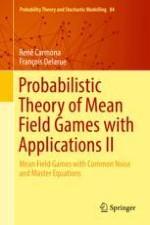This two-volume book offers a comprehensive treatment of the probabilistic approach to mean field game models and their applications. The book is self-contained in nature and includes original material and applications with explicit examples throughout, including numerical solutions.
Volume II tackles the analysis of mean field games in which the players are affected by a common source of noise. The first part of the volume introduces and studies the concepts of weak and strong equilibria, and establishes general solvability results. The second part is devoted to the study of the master equation, a partial differential equation satisfied by the value function of the game over the space of probability measures. Existence of viscosity and classical solutions are proven and used to study asymptotics of games with finitely many players.
Together, both Volume I and Volume II will greatly benefit mathematical graduate students and researchers interested in mean field games. The authors provide a detailed road map through the book allowing different access points for different readers and building up the level of technical detail. The accessible approach and overview will allow interested researchers in the applied sciences to obtain a clear overview of the state of the art in mean field games.
